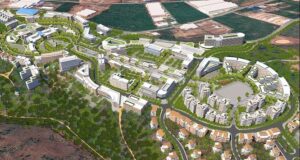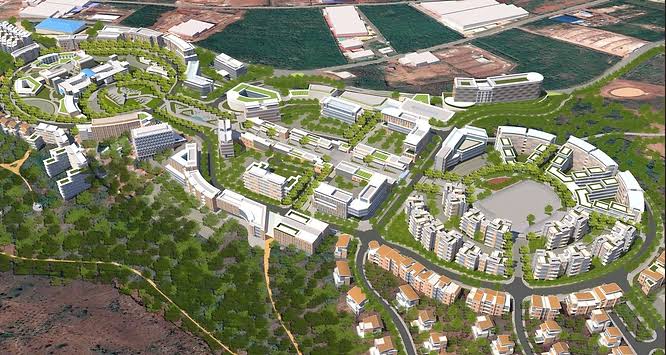In a move to solidify Rwanda’s position as a leading tech hub in Africa, the government has launched the construction of the highly anticipated Kigali Innovation City (KIC) project. The $2 billion initiative aims to transform the country into a global center for technology, research, and innovation.

The groundbreaking ceremony, presided over by Prime Minister Dr. Edouard Ngirente, marked the start of the construction of this state-of-the-art tech village within the Kigali Special Economic Zone in Gasabo District.
“KIC is more than just physical infrastructure. It is an ecosystem that will foster innovation, attract talent and international investment. With Africa50 and BADEA, we are building a brighter future,” said Prime Minister Ngirente, reaffirming the government’s commitment to the project.
Spanning 61 hectares, Kigali Innovation City is designed to become a hub for various fields, including data science, artificial intelligence, computer technology, and business innovation. The goal is to attract top talent and companies from around the world, creating 50,000 jobs and providing a collaborative space for innovators.
“Today, we get to be part of the birthing process of the KIC,” said Minister of ICT and Innovation, Paula Ingabire, who has been instrumental in the development of the project. “We hope to embed technology into the DNA of our corporate organizations, government institutions, and the country as a whole so that, 5 to 10 years from now, we can start seeing the unicorns that will come out of this place and put Rwanda on the map.”
The project is expected to mirror the success of Silicon Valley in the United States, home to global tech giants such as Google, Meta, and Microsoft. By cultivating a thriving tech ecosystem, Rwanda aims to generate $150 million in revenue from international projects facilitated by KIC and an additional $300 million from investments into the hub’s technological ventures.
“This project reflects a collective ambition of all our people to transform our country so that innovation, education, and technology can truly become a cornerstone for Rwanda’s future,” said Francis Gatare, CEO of the Rwanda Development Board (RDB), at the groundbreaking ceremony.
According to Gatare, at its peak, Kigali Innovation City is expected to create more than 50,000 jobs, positioning Rwanda as a global competitor in the technology marketplace. The city will also serve as a hub for returning Rwandan students, 2,600 of whom are currently studying abroad, to work in various companies set to establish themselves within the KIC.
The addition of Kigali Innovation City is expected to further enhance Rwanda’s profile on the global stage, as it provides a platform for both local and international companies to innovate and grow. The project is not just an economic endeavor but a vision for Rwanda’s future, with hopes of fostering the country’s first “unicorn” tech companies and establishing it as a continental leader in technological innovation.
“Being an innovator, I believe many technology-driven companies will want to come here because they will be supported in their efforts to make the future possible today,” says Lou Major, Senior Business Development Executive at ANSYS, on their decision to set up their first Africa office in Kigali Innovation City.
With groundbreaking projects like KIC, Rwanda is positioning itself as a force to be reckoned with in the global tech industry, solidifying its reputation as a hub for innovation and growth.




